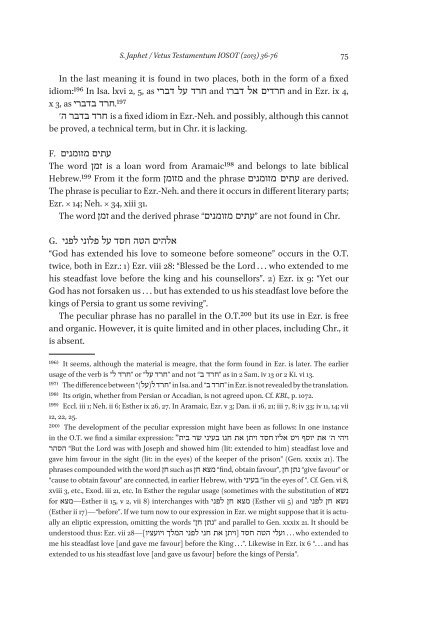Special Issue IOSOT 2013 - Books and Journals
Special Issue IOSOT 2013 - Books and Journals
Special Issue IOSOT 2013 - Books and Journals
You also want an ePaper? Increase the reach of your titles
YUMPU automatically turns print PDFs into web optimized ePapers that Google loves.
S. Japhet / Vetus Testamentum <strong>IOSOT</strong> (<strong>2013</strong>) 36-76 75<br />
In the last meaning it is found in two places, both in the form of a fixed<br />
idiom:196 In Isa. lxvi 2, 5, as חרד על דברי <strong>and</strong> חרדים אל דברו <strong>and</strong> in Ezr. ix 4,<br />
197.חרד בדברי x 3, as<br />
is a fixed idiom in Ezr.-Neh. <strong>and</strong> possibly, although this cannot חרד בדבר ה׳<br />
be proved, a technical term, but in Chr. it is lacking.<br />
עתים מזומנים .F<br />
The word זמן is a loan word from Aramaic198 <strong>and</strong> belongs to late biblical<br />
Hebrew.199 From it the form מזומן <strong>and</strong> the phrase עתים מזומנים are derived.<br />
The phrase is peculiar to Ezr.-Neh. <strong>and</strong> there it occurs in different literary parts;<br />
Ezr. × 14; Neh. × 34, xiii 31.<br />
The word זמן <strong>and</strong> the derived phrase מזומנים“ ”עתים are not found in Chr.<br />
אלהים הטה חסד על פלוני לפני .G<br />
“God has extended his love to someone before someone” occurs in the O.T.<br />
twice, both in Ezr.: 1) Ezr. viii 28: “Blessed be the Lord . . . who extended to me<br />
his steadfast love before the king <strong>and</strong> his counsellors”. 2) Ezr. ix 9: “Yet our<br />
God has not forsaken us . . . but has extended to us his steadfast love before the<br />
kings of Persia to grant us some reviving”.<br />
The peculiar phrase has no parallel in the O.T.200 but its use in Ezr. is free<br />
<strong>and</strong> organic. However, it is quite limited <strong>and</strong> in other places, including Chr., it<br />
is absent.<br />
196) It seems, although the material is meagre, that the form found in Ezr. is later. The earlier<br />
usage of the verb is ל“ ”חרד or על“ ”חרד <strong>and</strong> not ב” “חרד as in 2 Sam. iv 13 or 2 Ki. vi 13.<br />
197) The difference between ל)על)“ ”חרד in Isa. <strong>and</strong> ב” “חרד in Ezr. is not revealed by the translation.<br />
198) Its origin, whether from Persian or Accadian, is not agreed upon. Cf. KBL, p. 1072.<br />
199) Eccl. iii 1; Neh. ii 6; Esther ix 26, 27. In Aramaic, Ezr. v 3; Dan. ii 16, 21; iii 7, 8; iv 33; iv 11, 14; vii<br />
12, 22, 25.<br />
200) The development of the peculiar expression might have been as follows: In one instance<br />
ויהי ה׳ את יוסף ויט אליו חסד ויתן את חנו בעיני שר בית” expression: in the O.T. we find a similar<br />
“But the Lord was with Joseph <strong>and</strong> showed him (lit: extended to him) steadfast love <strong>and</strong> הסהר<br />
gave him favour in the sight (lit: in the eyes) of the keeper of the prison” (Gen. xxxix 21). The<br />
phrases compounded with the word חן such as מצא חן “find, obtain favour”, נתן חן “give favour” or<br />
“cause to obtain favour” are connected, in earlier Hebrew, with בעיני “in the eyes of ”. Cf. Gen. vi 8,<br />
נשא xviii 3, etc., Exod. iii 21, etc. In Esther the regular usage (sometimes with the substitution of<br />
נשא חן לפני (Esther vii 5) <strong>and</strong> מצא חן לפני Esther—מצא ii 15, v 2, vii 8) interchanges with for<br />
(Esther ii 17)—“before”. If we turn now to our expression in Ezr. we might suppose that it is actually<br />
an eliptic expression, omitting the words חן“ ”נתן <strong>and</strong> parallel to Gen. xxxix 21. It should be<br />
understood thus: Ezr. vii ועלי הטה חסד ]ויתן את חני לפני המלך ויועציו]—28 . . . who extended to<br />
me his steadfast love [<strong>and</strong> gave me favour] before the King . . .”. Likewise in Ezr. ix 6 “. . . <strong>and</strong> has<br />
extended to us his steadfast love [<strong>and</strong> gave us favour] before the kings of Persia”.








![Am HaSefer [Volk des Buches] - Books and Journals](https://img.yumpu.com/20648352/1/174x260/am-hasefer-volk-des-buches-books-and-journals.jpg?quality=85)







